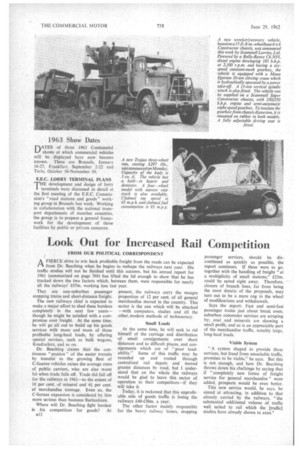Look Out for Increased Rail Competition
Page 46

If you've noticed an error in this article please click here to report it so we can fix it.
FROM OUR POLITICAL CORRESPONDENT
AFIERCE drive to win back profitable freight from the roads can be expected from Dr. Beeching when he begins to reshape the railways next year. His traffic studies will not be finished until this autumn, but his annual report for 1961 (summarized on page 768) has lifted the lid enough to show that he has tracked down the two factors which, between them, were responsible for nearly all the railways' £87m. working loss last year.
They are non-suburban passenger stopping trains and short-distance freight.
The new railways chief is expected to make a major effort to shed these burdens completely in the next few years— though he might be satisfied with a compromise over freight. At the same time, he will go all out to build up his goods services with more and more of those profitable long-haul loads, by offering special services, such as bulk wagons, Roadrailers, and so on.
Dr. Beeching claims that the continuous " erosion " of the easier transits by transfer to the growing fleet of C-licence vehicles raises the average costs of public carriers, who are also worst hit when trade falls off. Trade did fall off for the railways in 1961—to the extent of 10 per cent. of mineral and 41 per cent. of merchandise tonnage. Even so, the C-licence expansion is considered by him more serious than business fluctuations.
Where will Dr. Beeching fight hardest in his competition for goods? At B12 present, the railways carry the meagre proportion of 12 per cent, of all general merchandise moved in the country. This sector is the one which will be attacked —with computers, studies and all the other,modern methods of technocracy.
Small Loads At the same time, he will seek to rid himself of the carriage and distribution of small consignments over short distances and to difficult places, and consignments which are of "poor loadability." Some of this traffic may be rounded up and routed through centralized rail depots and moved greater distances by road, but I understand that on the whole the railways would be glad to leave this sector of operation to their competitors—if they will take it.
Today, it is reckoned that this unprofitable side of goods traffic is losing the railways £40-£50m. a year.
The other factor mainly responsible for the heavy railway losses, stopping passenger services, should be discontinued as quickly as possible, the report continues. If these were to go, together with the handling of freight "at a multiplicity of small stations," £25m. could be saved right away. Therefore, closure of branch lines, far from being the most drastic of the proposals, may turn out to be a mere cog in the wheel of modifications and withdrawals.
Says the report: Fast and semi-fast passenger trains just about break even; suburban commuter services are scraping by; coal and minerals are showing a small profit, and so is an appreciable part of the merchandise traffic, notably large, long-haul loads.
Viable System " A system shaped to provide these services, but freed from unsuitable traffic, promises to be viable," he says. But this is not enough, and here Dr. Beeching throws down his challenge by saying that if "completely new forms of freight service for general merchandise" were added, prospects would be even better.
This new service would, he says, be aimed at attracting, in addition to that already carried by the railways, "the substantial additional volume of traffic well suited to rail which the [traffic] studies, have already shown to exist."
















































































































































